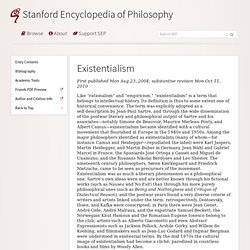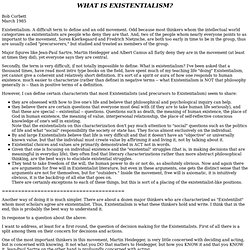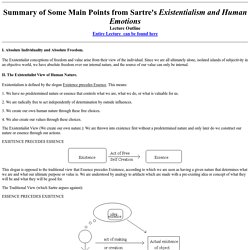

Existentialism. First published Mon Aug 23, 2004; substantive revision Mon Oct 11, 2010 Like “rationalism” and “empiricism,” “existentialism” is a term that belongs to intellectual history.

Its definition is thus to some extent one of historical convenience. The term was explicitly adopted as a self-description by Jean-Paul Sartre, and through the wide dissemination of the postwar literary and philosophical output of Sartre and his associates—notably Simone de Beauvoir, Maurice Merleau-Ponty, and Albert Camus—existentialism became identified with a cultural movement that flourished in Europe in the 1940s and 1950s.
Among the major philosophers identified as existentialists (many of whom—for instance Camus and Heidegger—repudiated the label) were Karl Jaspers, Martin Heidegger, and Martin Buber in Germany, Jean Wahl and Gabriel Marcel in France, the Spaniards José Ortega y Gasset and Miguel de Unamuno, and the Russians Nikolai Berdyaev and Lev Shestov. 1. 1.1 Kierkegaard: “The Single Individual” 2. What is Existentialism? Bob Corbett March 1985 Existentialism.

A difficult term to define and an odd movement. Odd because most thinkers whom the intellectual world categorizes as existentialists are people who deny they are that. And, two of the people whom nearly everyone points to as important to the movement, Soren Kierkegaard and Fredrich Nietzsche, are both too early in time to be in the group, thus are usually called "precursorers," but studied and treated as members of the group. Major figures like Jean-Paul Sartre, Martin Heidegger and Albert Camus all flatly deny they are in the movement (at least at times they did), yet everyone says they are central.
Secondly, the term is very difficult, if not totally impossible to define. However, I can define certain characterists that most Existentialists (and precursors to Existentialism) seem to share: Another way of doing it is much simpler. In response to a question about the above: If: I am a person serious about my acts. Then: Bob Corbett. Existentialism. I.

Absolute Individuality and Absolute Freedom. The Existentialist conceptions of freedom and value arise from their view of the individual. Since we are all ultimately alone, isolated islands of subjectivity in an objective world, we have absolute freedom over our internal nature, and the source of our value can only be internal. II. The Existentialist View of Human Nature. Existentialism is defined by the slogan Existence precedes Essence. 1. 2. 3. 4.
The Existentialist View (We create our own nature.): We are thrown into existence first without a predetermined nature and only later do we construct our nature or essence through our actions. This slogan is opposed to the traditional view that Essence precedes Existence, according to which we are seen as having a given nature that determines what we are and what our ultimate purpose or value is. The Traditional View (which Sartre argues against): The human situation for the Existentialist is thus characterized by: Existentialism. Existentialism – A Definition Existentialism in the broader sense is a 20th century philosophy that is centered upon the analysis of existence and of the way humans find themselves existing in the world.

The notion is that humans exist first and then each individual spends a lifetime changing their essence or nature. In simpler terms, existentialism is a philosophy concerned with finding self and the meaning of life through free will, choice, and personal responsibility. The belief is that people are searching to find out who and what they are throughout life as they make choices based on their experiences, beliefs, and outlook. And personal choices become unique without the necessity of an objective form of truth.
An existentialist believes that a person should be forced to choose and be responsible without the help of laws, ethnic rules, or traditions. Existentialism – What It Is and Isn’t Existentialism takes into consideration the underlying concepts: Learn More! Existentialism.